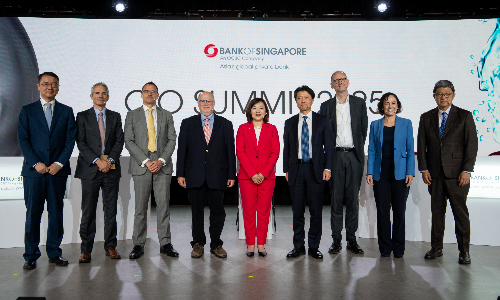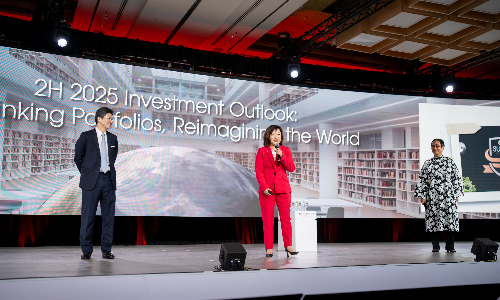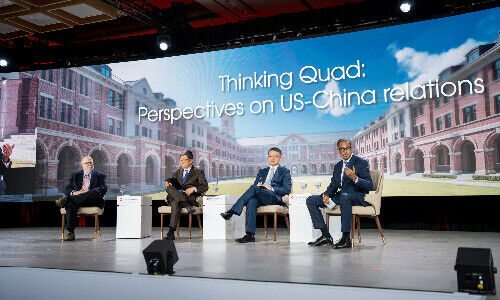Bank of Singapore CIO Summit: Turning Volatility Into Strategy
The Bank of Singapore’s CIO Summit 2025, held on Wednesday in Singapore, came at a critical moment. Just a day earlier, US President Donald Trump had once again escalated his economic confrontation with China, while Beijing appeared to be strategically exploiting the volatility of the global economy to its own advantage.
For investors, one thing is clear: markets will remain shaped by geopolitical volatility for the foreseeable future, requiring differentiated, long-term, and resilient insights. The central message of the Bank of Singapore conference: regardless of daily politics, the tectonic plates of the global economic system are shifting. Trade flows, supply chains, and capital movements are adapting to new realities.
Investors must take these shifts seriously, not only as a risk but as an opportunity for strategic reorientation. These issues were explored by high-profile experts, who also debated the provocative question: «Has Donald Trump made China great again?»
Trump: Unconventional Policy with Real Economic Impact

All roundtable participants (Image: BoS)
Adam Posen, President of the Peterson Institute for International Economics, pointed out that Trump’s policies are not irrational but strategic – even if they often defy classical economic logic. With his protectionist agenda, Trump is forcing companies to produce locally, aided by tax cuts and energy independence. This has triggered a trend toward re-industrialization in the US, opening up attractive investment opportunities in sectors such as engineering, energy, and raw materials.
However, this restructuring comes at a high price: uncertainty. «Weaponizing uncertainty» is Trump’s core tool for asserting geopolitical influence, with tangible consequences for the investment planning of multinational companies and, in turn, the valuation of their stocks.
China: Not Yet a Global Challenger
Despite widespread speculation about China’s rise, the experts painted a more nuanced picture. Guo Kai, Executive President of the CF40 Institute, emphasized that China is not yet structurally ready to assume a global leadership role – it lacks trust, global alliances, and a coherent long-term strategy. While China’s economic growth remains dynamic, it is still heavily driven by domestic politics and issue-specific moves.
For investors, this means: China remains a central but difficult-to-assess component of global portfolios – one with significant potential, but also considerable reputational and regulatory risks.
Macro Trends: Talent, AI, and Location Policy as Investment Drivers

BoS' CIO team Eli Lee, Jean Chia, and Owi Ruivivar, all BoS (from left, Image: BoS)
Three overarching macroeconomic trends emerged from the discussions – trends likely to shape financial markets over the coming years:
- Artificial Intelligence as an Economic Lever: Those with access to data, computing power, and talent can transform entire industries. Locations with open research cultures and regulatory flexibility – such as Singapore, South Korea, or Canada – are likely to benefit disproportionately.
- Global Mobility of Human Capital: Highly qualified professionals are drawn to regions offering quality of life, freedom, and innovation. Areas with targeted support programs, free expression, and stable investment conditions attract talent, leading to long-term economic outperformance.
- Subsidized Industrial Strategies: Both the US and China are increasingly relying on sector-specific support. This creates opportunities for investors in areas such as semiconductors, renewable energy, defense, and infrastructure.
ASEAN as a Strategic Beneficiary
Speakers unanimously emphasized that the ASEAN countries – especially Singapore, Indonesia, and Vietnam – could benefit significantly from the global realignment. These nations offer cost-efficient, politically stable alternatives to China, possess rapidly growing domestic markets, and are becoming increasingly integrated into global value chains.
For investors focused on emerging markets, this presents a compelling case for strategic portfolio rebalancing.
Volatility as an Opportunity – for Strategic and Flexible Investors
The CIO Summit 2025 made one thing abundantly clear: the world order is undergoing a fundamental transformation. Investors who cling to rigid models risk misreading economic reality.
However, for those with a long-term outlook, this transformation offers a broad range of opportunities – provided they think geopolitically, analyze systemically, and invest selectively.
The key takeaway: it’s not the short-term noise that matters, but the structural trends shaping the future, particularly in areas such as artificial intelligence, infrastructure, energy, security, and wealth management.




























